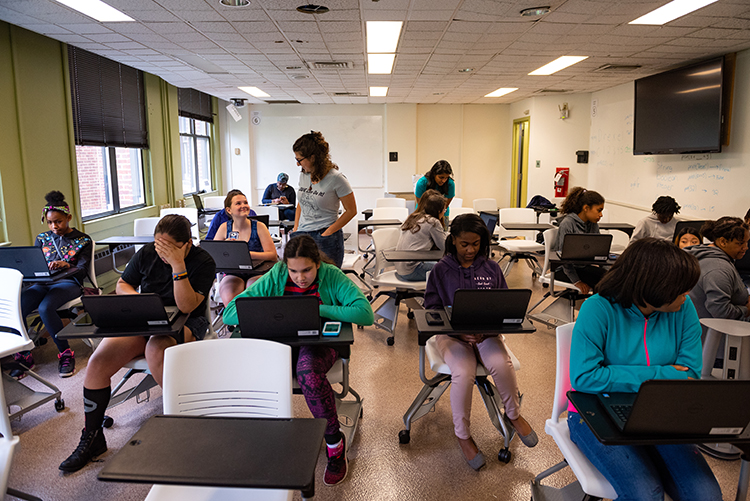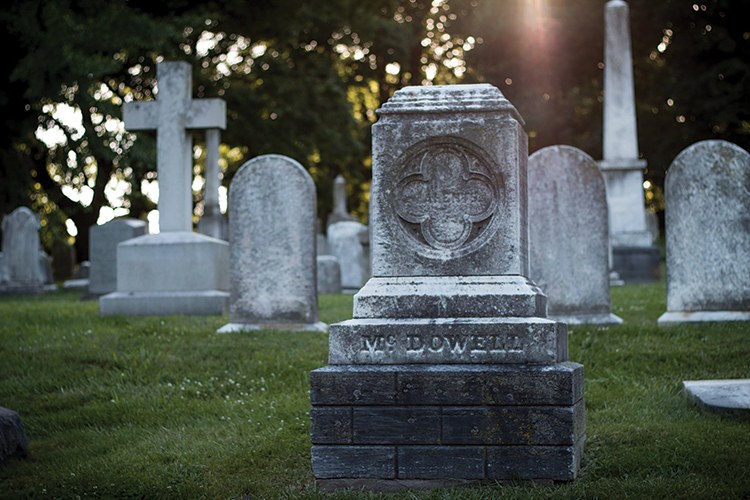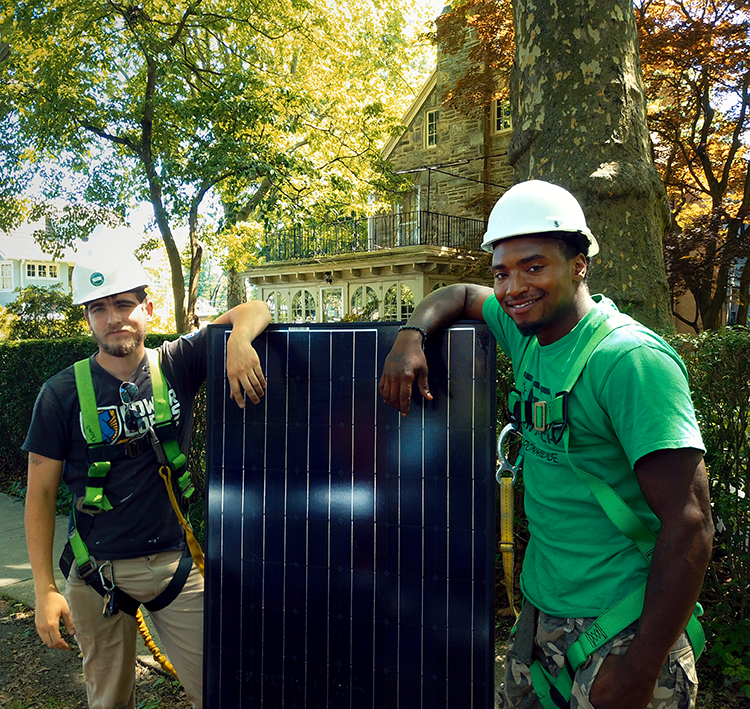Breaking the Code
By Melissa Simpson
After watching 2016’s Hidden Figures, a movie that documents the contributions made by three brilliant African-American women to the space race, then-10-year-old Cordelia Dunston decided that she wanted to be an engineer. Her father, who works on Drexel’s campus, heard about a program called TechShopz, managed by the nonprofit TechGirlz, and led by Drexel’s chapter of the Society of Women Engineers. He signed up his daughter for the program.
“I learned how to make a website using HTML, and we also made a game where we had to debug little programs in it—that was fun,” says Dunston of her experiences at TechShopz.
“I like how it is college girls who are trying to teach us to do things with engineering, because a lot of us have no clue what we are doing,” says Dunston. “They are a little bit more experienced than us, and they can teach us how to make things and have more insight into the engineering world and coding.”
For those who have even the slightest interest in the tech industry, it is common knowledge that Dunston’s story is not the norm. There is an enormous gap in the numbers of men and women who work in the field. According to the Economics and Statistics Administration in United States Department of Commerce, “Women filled 47 percent of all U.S. jobs in 2015 but held only 24 percent of STEM jobs.”
Tracey Welson-Rossman, CEO and founder of TechGirlz, started the volunteer-organized nonprofit with the hopes of combating this disparity in STEM while evoking a sense of excitement in middle school girls for the field of technology. According to their 2016–2017 annual report, since its inception eight years ago, TechGirlz has managed to impact almost 5,000 young women through project-based learning on topics such as coding in Python, designing mobile apps, learning UX, and robotics.
As Welson-Rossman explains, TechGirlz decided to focus on middle-school-aged girls when she came across a research study that suggested that girls lose interest in tech starting around 11 years old. A similar study that was conducted by Microsoft in 2017 suggests the same.
“In middle school, for example, 31 percent of girls believe that jobs requiring coding and programming are ‘not for them,’” reads the Microsoft report. “In high school, that percentage jumps up to 40. By the time they’re in college, 58 percent of girls count themselves out of these jobs.”
“We saw that there wasn’t a place for middle schools that was being worked,” says Welson-Rossman when discussing how 11- to 14-year-old girls were not being encouraged to pursue an interest in technology.
With a small core team, TechGirlz relies on partnerships with organizations like the Free Library of Philadelphia, Comcast TechWomen and the Drexel University chapter of Society of Women Engineers (SWE). In the case of SWE, young college women have the opportunity to teach and mentor younger girls about tech while reinforcing what they are currently learning in the classroom.
Recently, Jui Hanamshet, a 20-year-old second-year computer engineering student at Drexel and a SWE member, instructed about 15 middle school girls on how to code in Python in a small classroom on campus. Although Hanamshet, who has experience in both teaching and tutoring, was leading the Python TechShop for the first time, she had the assistance of a handful of other SWE members, including 19-year-old Elvira-Marie Mikhael, a second-year civil engineering major who has lead other TechShopz in the past.
Hanamshet is in an interesting position. On one hand, she is helping to bridge the gender gap in tech by partnering with TechGirlz. On the other, she is navigating classrooms that still reflect this disparity. For Hanamshet, doing this work helps to ensure that once these middle school girls reach college and perhaps take up a major in STEM, that they do not feel isolated.
“In my electrical computer engineering classroom, there is a ratio of 1 [female] to 5 [males]—sometimes it is even worse,” says Hanamshet. “Being able to facilitate for a very young age group, what science is and how amazing it can be and how amazing coding is, strikes a sort of domino effect—one girl can tell another girl how awesome it is, and she can tell her friend. I find it very satisfying to know that I am helping to shape the future.”
Mikhael, who works on the SWE Outreach team, found that developing a relationship with TechGirlz was a seamless process.
“There are already these established places like TechGirlz that are looking for people like us who are able to facilitate their own event,” she says. “We are both kind of looking for the same thing.”
By partnering with organizations like Drexel’s SWE chapter, TechGirlz has been able to make a meaningful impact in not only the lives of thousands of young girls but their parents as well.
“The first two and half years, when I was going to every single event, I had parents who would hug me and thank me,” says Welson-Rossman. “[T]he stories are consistent—the parents are just so happy that there are opportunities for their girls.”
TechGirlz is looking to branch out to other cities and replicate the impact that they have had on young women in Philadelphia. They set up shop in Chicago during the 2017–2018 school year. According to Welson-Rossman, by the end of the 2018 school year, it is projected that around 750 young women in the Windy City will have participated in a TechShop. TechGirlz is currently in the process of finding footing in the New York Metropolitan Area as well as Raleigh, North Carolina.
“I am just really proud of what we’ve been able to do with a small team,” says Welson-Rossman. “The impact that our team has had on the community of girls, parents and volunteers—to me it shows that we can make a difference.”






As a freshman in a high school that has many programs for boys and girls to pursue their passions, I think what TechGirlz is doing is excellent in terms of motivating and giving girls the opportunity to learn how to become computer engineers. It’s even more inspiring when girls around my age (or a bit younger than me) work with girls that are in college that are continuing to work on having careers a the STEM field. With Drexel supporting TechGirlz and working side-by-side with them, I’m sure more teenage girls will want to be in those workshops and realize that they can code, make websites, and do other amazing things with just one tap of a key on a keyboard. Hearing that they are using a project based learning format is even more exciting, this approach will boost creativity and interest while still learning all of the important things that they would if they were just reading a textbook. I believe more and more teenage girls will want to join the workshops and even join TechGirlz.
Sincerely,
Robyn Walter
A 9th grade Project Based Learning student at Cheltenham High School